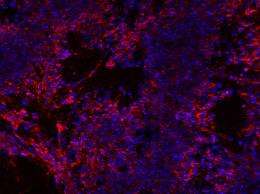Scientists to gain new insight into earliest development of human diseases

In an Australian first, scientists from Sydney IVF Stem Cells and the Australian Proteome Analysis Facility (APAF) at Macquarie University will use human embryonic stem cells to track the development of genetic conditions such as down syndrome, Huntington's disease and facioscapulohumeral muscular dystrophy in their very earliest stages.
It is hoped the groundbreaking research will not only lead to a better understanding of how these debilitating diseases develop, but also to the discovery of new and effective drug treatments.
Sydney IVF Stem Cells is the only medical research body in Australia to have been granted a National Health and Medical Research Council (NHMRC) licence to establish stem cell lines from embryos known to be carrying genetic diseases, following informed voluntary consent from their patients.
The organisation's involvement with Macquarie University has been made possible thanks to the NSW Government's Science Industry Fund, which has been set up to establish links between industry and the state's pre-eminent scientific service facilities.
Director of Research and Development at Sydney IVF Stem Cells, Dr Tomas Stojanov, said Sydney IVF "aims to develop new human stem cell laboratory-based bioassays able to mimic human responses to drugs. The benefit of this is that these will be used as models for uncommon but serious genetic diseases which will aid in developing new treatments."
APAF's senior scientist on the project, Dr Leon McQuade said this research "will allow us for the first time to track diseases using a human model from five to seven days post-fertilisation - from an embryonic state through the first critical stages of development".
"Our focus will be to analyse the effect the mutation is having on proteins - the master regulators of nearly all cellular processes. In particular, we are interested in changes to proteins on the surface of cells, resulting from the mutation, which can be targeted for new drug development going forward," McQuade said.
APAF Director, Professor Mark Baker, said the field of membrane proteomics, which includes analysis of cell surface proteins, was pivotal to APAF's and Sydney IVF Stem Cells' current research collaboration involving stem cells.
"Membrane proteomics remains technically challenging, but recent advances pioneered at APAF means greater numbers of these proteins are now being revealed."
Researchers are optimistic that the initial 12 month partnership between Macquarie University and Sydney IVF Stem Cells will lead to further grants and ongoing research collaboration.
"Responsible and ethical research using human embryonic stem cells has enormous potential to contribute positively to health care in the future," Baker said.
"The partnership with Sydney IVF Stem Cells presents a unique opportunity to take our understanding of the role of proteins in genetic diseases to another level and to develop treatments that could potentially make a difference to millions of lives around the world."
The Science Industry Fund is available for industry partners that would like to access any of the services provided by the Australian Proteome Analysis Facility, the Ramaciotti Centre for Gene Function Analysis at the University of New South Wales, the Bioanalytical Mass Spectrometry Facility at UNSW, the Systems Biology Initiative at UNSW, and the Centre for Plant Conservation Genetics at Southern Cross University.
Provided by Macquarie University